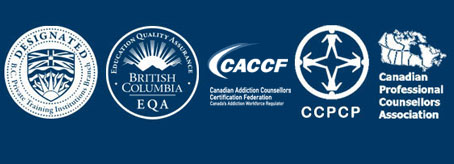ITT-400 Introduction to Teletherapy

Course Overview:
Introduction to Teletherapy (ITT-400) is a three week course .
Teletherapy,(sometimes referred to as telephone, video or e-counselling) takes place through an electronic medium involving telephone and video transmission. To ensure the same quality of therapy as face-to-face sessions, e-counsellors are expected to demonstrate competency in basic counselling skills.
Introduction to Teletherapy provides students the opportunity to modify and integrate their face-to-face counselling style for use via telephone or video sessions. The result is a unique counselling approach applicable to an entry-level scope of practice. Structure of the sessions reflect the student’s training, personality, values, and therapeutic modality. Information is also provided on how to set up and operate a counselling practice over the telephone or through video transmission while maintaining clients’ confidentiality and privacy.
Course Content:
Topics: an overview of current research on the use and effectiveness of e-counseling online, and data on the idiosyncrasies of online behavior and communication. Discussion of practical aspects of Teletherapy include: applicable skill sets and required competencies, technological, ethical, legal considerations; confidentiality, cultural diversity, assessment and treatment strategies; and ideas on how to set up an e-counselling practice.
Skills:
- how to design forms and develop the business structure for a telephone or video counselling practice.
- how to deliver informed consent, open the Teletherapy session, and build a therapeutic alliance within the telephone or video context.
- how to assess for client’s readiness for e-counselling, goals and treatment planning.
- identify and prioritize issues from the intake questionnaire to gently guide the session.
- use reflective listening to demonstrate empathy
- identify patterns of client’s thoughts, emotions, and behaviors related to the presenting problem.
- deepen the online session using exploratory questions and counselling techniques that flow naturally from client’s previous responses
- recognize entry-level scope of practice and make appropriate referrals as needed.
- close the telephone or video sessions with validation and non-threatening homework to maintain continuity for next session.
- Use of outcome measures to determine progress and readiness for termination.
- Protect client confidentiality and privacy when using online delivery of services.
PORTFOLIO OF JOB SKILLS
You may include the following skills learned in this elective course as part of your Professional Portfolio:
- The ability to utilize therapeutic modalities to facilitate the sessions.
- The ability to select counselling exercises appropriate for telephone or video delivery.
- The ability to identify client’s resistance and/or progress through nuances in the telephone or video communication.
- The ability to develop outcome measures to test the efficacy of the therapy process, and recognize readiness for termination.
- Ability to assess for scope of practice re: client’s level of functioning, risk of suicide or self-harm; appropriate referrals; identify if client is a good candidate for this type of intervention.
- The ability to apply the e-counselling model to a wide variety of issues in otherwise, well-functioning clients who present with symptoms such as anxiety symptoms, feelings of depression, interpersonal conflicts, damaged self-esteem, unresolved losses, maladaptive behaviors, guilt, and addictions.
- Ability to recognize the counsellor’s own attitudes and emotional reactions that may be triggered. These and other professional/counter transference issues to be addressed in supervision.
- Ability to design practice management forms and business structure appropriate for an e-counselling practice.
EMPLOYMENT OPTIONS
Skills learned in this elective may be applicable to entry-to-mid-level employment as a counselor in a variety of mental health settings such as:
- Consulting with private businesses
- Outpatient mental health clinics
- Home support services
- Women’s shelters and centers
- Crisis line.
- Victim’s assistance outreach teams.
- Substance abuse treatment facilities.
- Outpatient hospital counselling services.
- Pastoral and faith-based counselling.
- First Nations wellness centers.
- Support services for parents, children and youth.
- Private practice (under supervision of an experienced clinician).
- Counselling in public agencies for recipients of financial assistance and social services.
- Counselling services in post-secondary schools.
- Human resource departments in private business and public agencies.
- Career planning/ employment agencies.
NOTE: Specialized training from an accredited program is advised for counsellors who intend to offer online, telephone, or cinema therapy. In order to obtain liability insurance, and apply for designation through professional associations, or regulatory colleges, entry level counsellors are required to practice under supervision for the first two years following graduation.
Counsellors residing in Canada who are members of a professional association or regulatory college, are permitted to provide the types of mental health services that fall within their scope of training and ethical standards.
A specialized courses in e-Counselling offered through KCPC, conform to ethical guidelines and competency standards established by the Ministry of Advanced Education in BC; the Competency Profile for Counselling Therapists; the Canadian Professional Counsellors Association, (CPCA); Association of Cooperative Counselling Therapists, (ACCT); and the Canadian College of Professional Counsellors and Psychotherapists (CCPCP).






